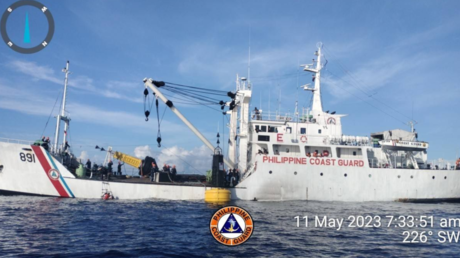
Manila has placed navigational buoys around the Spratly Islands, in defiance of China’s territorial assertions
The Philippines has staked its claim to a disputed area of the South China Sea by placing navigational buoys around the Spratly Islands, challenging Beijing’s alleged sovereignty over the area amid rising geopolitical tensions in the region.
Five buoys bearing the country’s national flag were placed around the islands between May 10 and May 12, the Philippine Coast Guard (PCG) said on Sunday. They were all installed within Manila’s 200-mile Exclusive Economic Zone (EEZ) and marked the “critical areas” of Patag Island, Kota Island, Panata Island and the Balagtas and Juan Felipe reefs.
“This move highlights the Philippines’ unwavering resolve to protect its maritime borders and resources and contribute to the safety of maritime trade,” PCG Commodore Jay Tarriela said in a Twitter post.
Chinese officials haven’t yet responded to the statement. Beijing has claimed sovereignty over the Spratly Islands and surrounding waters as falling within its “nine-dash line,” which encompasses about 90% of the South China Sea and overlaps the territorial claims of Taiwan and five Southeast Asian nations.
China has dredged the seafloor to create artificial islands in the region, featuring airstrips and missile launchers, and has deployed hundreds of vessels in the disputed areas. An international tribunal ruled in favor of the Philippines in 2016, saying the nine-dash line has no basis in international law — a finding that Beijing dismissed as “null and void.”
The Philippines has forged closer ties with the US since President Ferdinand Marcos Jr. took office last year. Marcos, who visited the White House earlier this month, agreed in February to allow the US military to station forces on four additional bases in the Philippines. Chinese officials have warned that strengthening defense ties with Washington will “drag the Philippines into the abyss of geopolitical strife.”
READ MORE: US to build new military bases near South China Sea




